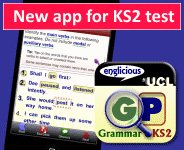Modality
When we talk (or write), we often make statements of fact about the world: It's hot today; I'm hungry; Tomorrow is my birthday. However, this is not always the case.
We often talk about what is possible or necessary: for example, what might happen or what somebody must do. This kind of meaning is called modality.
Welcome back!

Englicious is totally free for everyone to use!
But you will have to log in to see our library of teaching resources.
If you don’t have an account, that’s perfectly OK. You can register (for free).
It only takes a minute or two.

